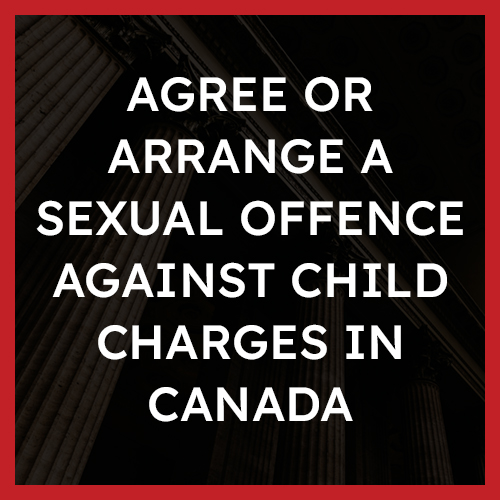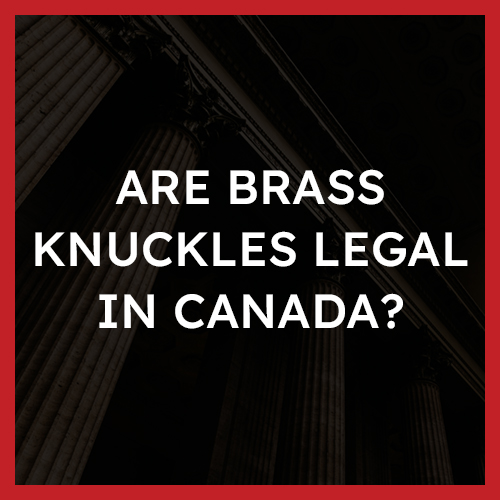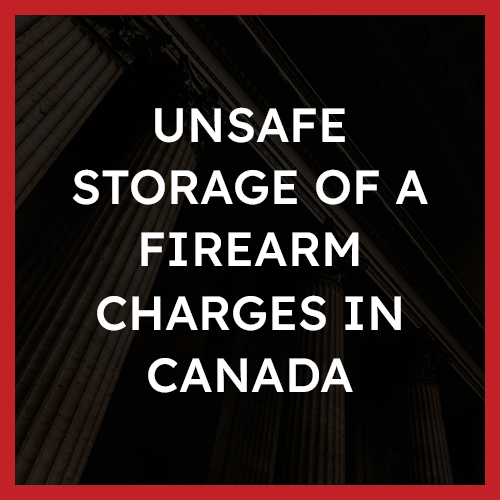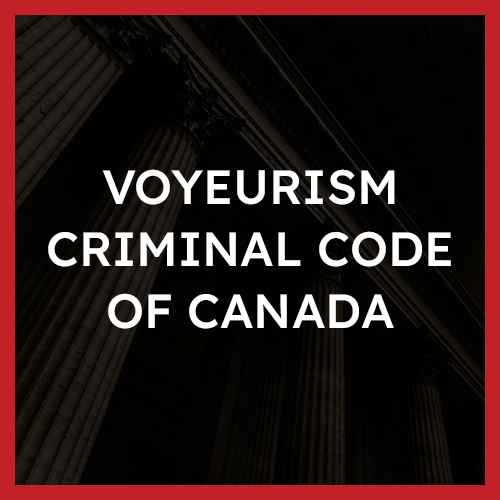Agree or Arrange a Sexual Offence Against Child (s. 172.2) Laws in Canada
What is an agree or arrange a sexual offence against child charge?

An agreement or arrangement of a sexual offence against a child charge occurs when a person by means of telecommunication, agrees or makes an arrangement with a person to commit an offence against a child that is sexual in nature.
An agreement or arrangement of a sexual offence against a child charge is a hybrid offence with a Crown election. This means that depending on the circumstances of your case the Crown can elect to proceed by indictment or summarily. If an accused is prosecuted by indictment, there is a Defence election of court under s. 536(2) of the Criminal Code.
Examples
Some examples of an agreement or arrangement of a sexual offence against a child charge may include the following:
- Agreeing or arranging with another person to make child pornography;
- Agreeing or arranging with another person to engage in bestiality in the presence of or by a child;
- Agreeing or arranging with another person to commit aggravated sexual assault against a child; and
- Agreeing or arranging with another person to sexually interfere with a child.
Defences
The defences available to an agreement or arrangement of a sexual offence against a child charge depend entirely on your case’s facts.
However, some defences to an agreement or arrangement of a sexual offence against a child charge may include:
- The accused was wrongly identified as the person who agreed to or arranged a sexual offence against a child;
- The messages sent by the accused from the perspective of an “ordinary reasonable person” were fantasizing or role-playing;
- There are no telecommunication records of the prohibited act; and
- The accused lacked the subjective mens rea of the offence.
Punishment
An agreement or arrangement of a sexual offence against a child charge is a hybrid offence, which entails a maximum punishment as follows:
- Imprisonment for 14 years if prosecuted by indictment.
- Imprisonment for 2 years less a day if prosecuted summarily.
Punishments for agreeing or arranging a sexual offence against a child depend on the circumstances of your case. If prosecuted by indictment, the mandatory minimum punishment is 1 year of jail time. If prosecuted summarily, the mandatory minimum punishment is 6 months of jail of time.
An agreement or arrangement of a sexual offence against a child charge will entail severe consequences for current and future employment opportunities and immigration status.
Overview of the Offence
According to s. 172.2 of the Criminal Code:
Agreement or arrangement – sexual offence against child
172.2 (1) Every person commits an offence who, by a means of telecommunication, agrees with a person, or makes an arrangement with a person, to commit an offence
- under subsection 153(1), section 155, 1, 170, 171or 279.011 or subsection 279.02(2), 279.03(2), 286.1(2), 286.2(2) or 286.3(2) with respect to another person who is, or who the accused believes is, under the age of 18 years;
- under section 151or 152, subsection 160(3) or 173(2) or section 271, 272, 273 or 280 with respect to another person who is, or who the accused believes is, under the age of 16 years; or
- under section 281with respect to another person who is, or who the accused believes is, under the age of 14 years.
Punishment
(2) Every person who commits an offence under subsection (1)
- is guilty of an indictable offence and is liable to imprisonment for a term of not more than 14 years and to a minimum punishment or imprisonment for a term of one year; or
- is guilty of an offence punishable on summary conviction and is liable to imprisonment for a term of not more than two years less a day and to a minimum punishment of imprisonment for a term of six months.
Presumption
(3) Evidence that the person referred to in paragraph (1)(a), (b) or (c) was represented to the accused as being under the age of 18, 16 or 14 years, as the case may be, is, in the absence of evidence to the contrary, proof that the accused believed that the person was under that age.
No Defence
(4) It is not a defence to a charge under paragraph (1)(a), (b) or (c) that the accused believed that the person referred to in that paragraph was at least 18, 16 or 14 years of age, as the case may be, unless the accused took reasonable steps to ascertain the age of the person.
No Defence
(5) It is not a defence to a charge under paragraph 1(a), (b) or (c)
- that the person with whom the accused agreed or made an arrangement was a peace officer or a person acting under the direction of a peace officer; or
- that, if the person with whom the accused agreed or made an arrangement was a peace officer or a person acting under the direction of a peace officer, the person referred to in paragraph (1)(a), (b) or (c) did not exist.
The Guilty Act (Actus Reus)
The actus reus for an agreement or arrangement of a sexual offence against a child charge under s. 172.2 is established by proof, beyond a reasonable doubt, of the following:
Sexual assault with a weapon s. 272(a)
- The accused at a specified date and time, in the correct jurisdiction, made an agreement or arrangement with a person to commit an offence against a child;
- The prohibited act was done “by means of telecommunication”; and
- The agreement or arrangement was to commit one of the offences listed under s. 172.2(a), (b), or (c).
R v Vander Leeuw held that there is no requirement for the Crown to prove that the “accused actually followed through on the agreement or arrangement to commit an offence” (para 48). This case also held that the actus reus for the offence is complete once the agreement or arrangement is made due to the preventative objective of the offence (para 31).
Additionally, “the child victim need not always exist… under 172.2(5) the non-existence of the child is not a defence where the agreement or arrangement is with a peace officer” (para 31). This also means that the meeting between the accused and the child is not necessary to prove the actus reus of the offence.
The Guilty Mind (Mens Rea)
The mens rea for an agreement or arrangement of a sexual offence against a child charge under s. 172.2 includes proving, beyond a reasonable doubt, that:
- There was an intention to enter into an agreement or make an arrangement; and
- The agreement or arrangement was for the specific purpose or intent of committing an offence against a child.
R v Vander Leeuw held that the mens rea for 172.2 must be determined subjectively. This means that the trier of fact will consider what was actually in the mind of the accused at the time of the guilty act. Subjective mens rea can be made out through the intent, knowledge, or recklessness of the accused.
R v Jeffers held that when analyzing the seriousness of the accused’s agreement or arrangement, the message must be looked at through the perspective of an ordinary reasonable person and whether that person would view the messages as an invitation to commit a sexual offence against a child. Jeffers also held that the trier of fact should attempt to decipher the accused’s state of mind through direct and circumstantial evidence.
Defences
How to beat an agreement or arrangement to commit a sexual offence against a child charge
Every case is different. The availability and strength of any defence depend entirely on the specific facts of your case. The strength of any available defence rests on the evidence against you and the precise details of the allegations. However, the following are some common defences that may be used when fighting an agreement or arrangement to commit a sexual offence against a child charge:
Factual innocence
A strong defence against an agreement or arrangement to commit a sexual offence against a child charge is to maintain that you are factually innocent. If you can show that the facts and the evidence do not support that you agreed or arranged to commit a sexual offence against a child with another person, then you may have a defence that you were factually innocent.
Veracity of Messages
If your messages agreeing or arranging to commit a sexual offence against a child were not intended to commit the actual crime, then you lack the mens rea for the offence. The veracity of your messages will be assessed from the perspective of an ordinary reasonable person and will be examined based on the context and circumstances in which the messages were sent.
Mistake in Identity
Depending on the circumstances of your case, a possible defence to an agreement or arrangement to commit a sexual offence against a child charge may be to raise an identity defence. In this case, for this defence to be raised successfully, you will have to prove that you were not the person who agreed or arranged to commit a sexual offence against a child.
Any applicable Charter defences
The Charter sets out your rights and freedoms before and after your arrest. If the police fail to abide by these rights deliberately or inadvertently, it could aid in your defence. If any of your Charter rights have been violated before or after your arrest, you may be able to have some or all of the evidence that the Crown is relying on to secure a conviction excluded under s. 24(2) of the Charter.
Punishments
The Criminal Code provides for a possible maximum term of 14 years imprisonment for those convicted of an agreement or arrangement to commit a sexual offence against a child charge.
Persons found guilty of agreeing or arranging to commit a sexual offence against a child will only be eligible for sentencing entailing custody as the minimum penalty is 6 months of incarceration. This means that there are no discharges, suspended sentences, stand-alone fines, or conditional sentences available for this charge.
In addition to any immediate sentence you receive for a conviction of agreeing or arranging to commit a sexual offence against a child, you will also be ordered to register with the National Sex Offender Registry in accordance with the National Sexual Offender Information Registry Act (SOIRA).
As a registered sex offender, you will have to provide the police with personal information including:
- Where you live;
- What car you drive; and
- What you do for work
Frequently Asked Questions
Can you go to jail for Agree or Arrange a Sexual Offence Against Child Charge?
Yes, if you are convicted of agreeing to or arranging a sexual offence against a child you will face jail time. This charge carries mandatory minimums of 6 months of jail time for those prosecuted summarily and 1 year of jail time for those prosecuted by indictment.
Is Agree or Arrange a Sexual Offence Against Child a Serious Offence?
Yes, agreeing to or arranging a sexual offence against a child charge is a serious offence and is prosecuted harshly. There is mandatory jail time upon conviction. Additionally, due to the nature of the offence, the Crown is not required to prove that the accused actually committed a sexual offence against a child, only that they agreed or arranged to do so.
Is Agree or Arrange a Sexual Offence Against Child a Summary or Indictable Offence?
Agreeing to or arranging a sexual offence against a child charge is known as a hybrid offence. This means that the Crown can choose to prosecute the accused summarily or by indictment. Regardless of how the Crown proceeds, this charge carries with it mandatory minimums of jail time.
Published Decisions
R v Ramelson, 2022 SCC 44 (CanLII)
The accused was charged with 172.2(1)(b) for communicating with an undercover police officer who posed as an underage child. The accused text-messaged the undercover officer and agreed to sexual services. The accused was arrested by police when he arrived at a hotel to meet up with the undercover officer.
The accused was convicted at trial but applied to stay the proceedings based on entrapment. However, the Supreme Court dismissed the appeal and the conviction was upheld.
You can read the full decision here.
R v Vander Leeuw, 2020 ABCA 293 (CanLII)
The accused was convicted of transmitting child pornography and for three counts of agreeing or arranging to commit sexual offences against a child. The accused was sentenced to 45 months of incarceration and was seeking a judicial interim release. The Alberta Court of Appeal denied the accused’s application for release.
You can read the full decision here.
R v Duplessis, 2018 ONCJ 912 (CanLII)
The accused was convicted 172.2(2) where the Crown proceeded by summary conviction. At the conclusion of the trial, the accused moved for a stay of proceedings under s. 7 of the Charter of Rights and Freedoms arguing that they were entrapped by the police which was dismissed.
The accused was sentenced to a 1-year jail sentence to be followed by 2 years of probation.
You can read the full decision here.
About The Author
Ask A Question
We endeavor to respond to questions within 24 hours. If your matter is urgent, please call our office or submit a request for a free consultation.







